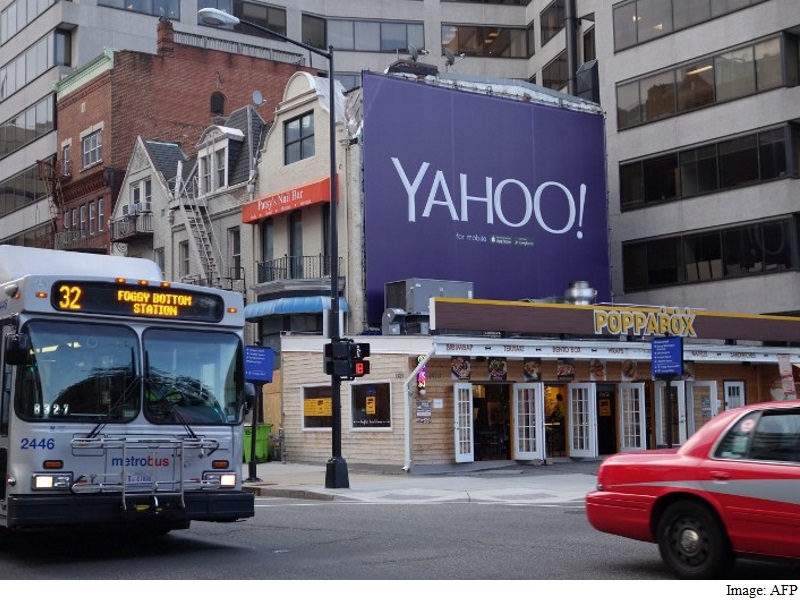- Home
- Internet
- Internet News
- US Internet Ruling Could Hit Verizon, AT&T's Pursuit of Yahoo
US Internet Ruling Could Hit Verizon, AT&T's Pursuit of Yahoo

The US Court of Appeals for the District of Columbia on Tuesday upheld the Obama administration's landmark rules barring Internet service providers from blocking or slowing down consumer access to web content. This dealt a blow to big cable and mobile phone companies, which plan to appeal the decision in the full appellate court or Supreme Court and urge Congress to intervene.
Both Verizon and AT&T are bidding for Yahoo's web assets and are primarily interested in Yahoo's advertising technology tools that leverage user data to deliver targeted ads. A part of the new rules could limit their ability to collect and use customer data to boost ad revenue.
"If things continue on the current trajectory, we're looking at a world where Verizon or AT&T's hands could be tied with respect to how they use data that is the heart of the Yahoo strategy," MoffettNathanson analyst Craig Moffett said. He noted that "someone like Google or another edge provider would be free to use the data a lot more liberally."
The restrictions on collecting user information "makes the data less valuable for Verizon or AT&T," said Recon Analytics analyst Roger Entner.
Verizon and AT&T declined to comment.
The "net neutrality" or "open Internet rules" were crafted by the Federal Communications Commission last year.
Data privacy rules in the new regulations proposed by the FCC earlier this year would limit an Internet provider's ability to collect user data and share it with advertisers and other third parties. The data privacy rules have yet to take effect, as the FCC is sifting through public comments before putting together a final version.
According to the data privacy rules, Internet providers such as AT&T and Verizon would have to ask users to consent or "opt-in" before their data, such as which sites they visit and personal information, can be used by Internet providers.
With the opt-in rule, "you could potentially get much, much lower user participation rates at Verizon and AT&T and (this)could significantly limit the value of the ad inventory to advertisers," Moffett said.
Verizon acquired AOL last June for $4.4 billion, entering the advertising-supported Internet business, and launched its millennial-focused video service go90. AT&T is making a big mobile video push by later this year launching online streaming services after acquiring DIRECTV and "VRV" an on-demand video, subscription service for young viewers.
Their video and advertising ambitions pits the two against the Internet giant, Alphabet Inc's Google.
Online service providers such as Netflix, Facebook and Twitter are not regulated by the FCC, but by the Federal Trade Commission. They are subject to less-stringent data privacy limitations, giving them more flexibility in making money from user data, Moffett and Entner said.
© Thomson Reuters 2016
Get your daily dose of tech news, reviews, and insights, in under 80 characters on Gadgets 360 Turbo. Connect with fellow tech lovers on our Forum. Follow us on X, Facebook, WhatsApp, Threads and Google News for instant updates. Catch all the action on our YouTube channel.
Related Stories
- Samsung Galaxy Unpacked 2026
- iPhone 17 Pro Max
- ChatGPT
- iOS 26
- Laptop Under 50000
- Smartwatch Under 10000
- Apple Vision Pro
- Oneplus 12
- OnePlus Nord CE 3 Lite 5G
- iPhone 13
- Xiaomi 14 Pro
- Oppo Find N3
- Tecno Spark Go (2023)
- Realme V30
- Best Phones Under 25000
- Samsung Galaxy S24 Series
- Cryptocurrency
- iQoo 12
- Samsung Galaxy S24 Ultra
- Giottus
- Samsung Galaxy Z Flip 5
- Apple 'Scary Fast'
- Housefull 5
- GoPro Hero 12 Black Review
- Invincible Season 2
- JioGlass
- HD Ready TV
- Latest Mobile Phones
- Compare Phones
- Leica Leitzphone
- Samsung Galaxy S26+
- Samsung Galaxy S26 Ultra
- Samsung Galaxy S26
- iQOO 15R
- Realme P4 Lite
- Vivo V70
- Vivo V70 Elite
- Asus TUF Gaming A14 (2026)
- Asus ProArt GoPro Edition
- Huawei MatePad Mini
- Infinix Xpad 30E
- Huawei Watch GT Runner 2
- Amazfit Active 3 Premium
- Xiaomi QLED TV X Pro 75
- Haier H5E Series
- Asus ROG Ally
- Nintendo Switch Lite
- Haier 1.6 Ton 5 Star Inverter Split AC (HSU19G-MZAID5BN-INV)
- Haier 1.6 Ton 5 Star Inverter Split AC (HSU19G-MZAIM5BN-INV)
















